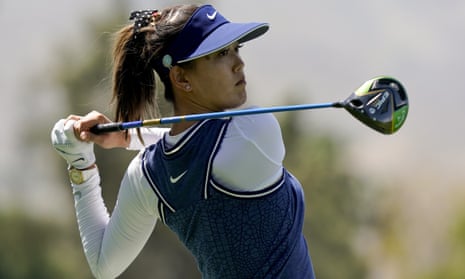On Wednesday, I sat in a room with media executives working on a pitch for a series about the LPGA. We discussed multiple storylines that ranged across racial and social borders. Stories about South Korean, African American, Latina and white players. Stories about players who grew up in poverty but made it on tour; women who were born into privilege but are using their privilege for good. The LPGA is more diverse than many would have you believe: more than 25 countries are represented on tour this year. Last year, women from 10 different countries won tournaments.
Why does this matter? Because on Wednesday, Hank Haney, a golf instructor best known for coaching Tiger Woods during his prime, proved he knows little about women’s golf, but that he’s capable of spouting racist and sexist nonsense. Haney was asked by co-host Steve Johnson on their radio show about the Women’s US Open, which starts on Thursday.
“I’m gonna predict a Korean [will win],” Haney said.
“That’s a pretty safe bet,” Johnson replied.
“That’s gonna be my prediction. I couldn’t name you, like, six players on the LPGA Tour,” Haney said, before adding: “Well, I’d go with Lee. If I didn’t have to name a first name, I’d get a bunch of them right. I don’t know. ... Lexi Thompson. ... Michelle Wie’s hurt. I don’t know that many.”
Haney, who has since apologized for his comments, probably thought he was being funny. Instead his comments told us much about how little he values women’s golf. Jeehae Lee, a former LPGA player who moved to the US from South Korea in the sixth grade, responded on Twitter. “This is why @HankHaney’s comments hurt,” she wrote, “by publicly admitting that he sees a bunch of the same “Lee’s” on the LPGA, he has normalized the view that these women on the @lpga are nameless, faceless golfing robots who aren’t worthy of individual humanity.”
Too many of these girls, Korean or not, have worked countless hours and sacrificed so much to play in the US Open this week. There are so many amazing players in the field. Let’s celebrate them....Not mock them. @HankHaney https://t.co/YB25Bl9zoC
— Michelle Wie (@themichellewie) May 29, 2019
Wie, one of the few players Haney appears to have heard of, was similarly dismissive. “Too many of these girls, Korean or not, have worked countless hours and sacrificed so much to play in the US Open this week. There are so many amazing players in the field. Let’s celebrate them....Not mock them,” she wrote.
By admitting that he knows next to nothing about one of the biggest tournaments in women’s golf, Haney also proved he has no business hosting a show on a prominent golf channel.
But what Haney said is not surprising – there are countless examples of how bigotry has reared its ugly head in the sport. From African Americans, Jewish people, and female players being barred from joining golf clubs; to women only being allowed to play at certain times at many courses; to black women having police called on them while playing a round; to Asians players being blamed for the LPGA not being more popular (it should be noted the tour has experienced exponential growth in its fanbase). Racism and sexism is embedded in golf, and it has taken decades to repair the image of the game and make it appear welcoming and open to all. And there is clearly still work to be done.
In this context, it is hard to shovel all the blame on Haney. The golf media mostly treats the LPGA like a blip on the radar, rarely telling the stories of the brilliant Asian players Haney was so quick to dismiss. So it was strange to see major golf publications calling out Haney when they are part of the problem – their social media channels and websites make you wonder if a professional women’s golf tour that has been around for 69 years exists at all. And the reality is, the publications that attacked Haney have more of a responsibility than Haney to promote women’s golf. How can we take the media seriously on this when they’ve done little to show that they value the LPGA?
There are steps that can be taken to improve matter. Perhaps SiriusXM could cancel Haney’s show and replace it with one that covers the LPGA exclusively. And maybe golf media as a whole will do better at highlighting the various stories of the diverse group of women who compete on the LPGA.
Until we wait in hope, make sure to tune in to the Women’s US Open where more than 20 countries will be represented in the second major of the year. And if you don’t know more than six players names, learn some more. There are plenty of great stories out there.
